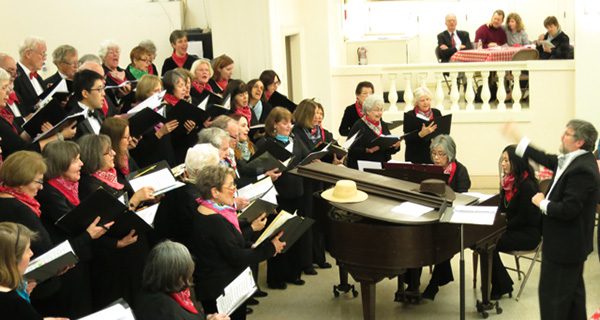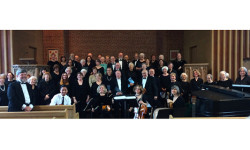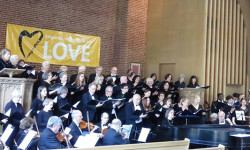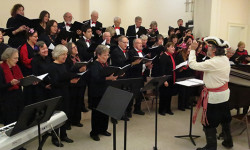The Wellesley Choral Society will present A Gilbert and Sullivan Mashup in Cabaret on Saturday, Feb. 11 at 7 p.m. at the Wellesley Hills Congregational Church, 207 Washington St. The Society’s casual pops-style, family-friendly entertainment includes complimentary refreshments as well as a silent auction and, of course, a wide selection of Gilbert and Sullivan songs.
W. S. Gilbert (1836–1911) began writing comic pieces in the 1860s to supplement the income of a failing law career. Published with his own funny drawings, the Bab Ballads (“Bab” being his childhood nickname) were immensely popular; several Gilbert and Sullivan operas have their roots in the Ballads.
Arthur Sullivan (1842-1900) was composing anthems and songs as a schoolboy. His incidental music to Shakespeare’s “The Tempest,” performed at London’s Crystal Palace in 1862, was a sensation. His religious music, widely sung, included “Onward Christian Soldiers.” As England’s most promising young composer, he had already ventured into comic opera when he met Gilbert.
Their initial collaboration (“Thespis,” 1871), a great success, was followed by a further thirteen comic operas. British appetite for musical theatre was growing at the time thanks to a rapidly expanding population, improvement in education, and a higher standard of living, especially of the middle class. Better public transportation and installation of street lighting made travel home from the theatre safer. The number of pianos manufactured in England doubled between 1870 and 1890 as more people began to play parlor music at home and more theatres and concert halls opened. To this audience Gilbert and Sullivan offered quality musical entertainment suitable to Victorian tastes.
Gilbert and Sullivan’s comic genius lay in creating what they called a “topsy-turvy” world, and treating with complete mock seriousness its absurdities - a young man apprenticed to pirates who are actually “nobles gone astray” (“Pirates of Penzance”), or a condemned criminal appointed Lord High Executioner in a country where flirting is a capital crime (“Mikado”). This technique they applied to satirize the vanities of their culture.
So the Pirate King declares: “I sink a few more ships, it’s true/Than a well-bred monarch ought to do;/But many a king on a first-class throne/If he wants to call his crown his own/Must manage somehow to get through/More dirty work than ever I do!”
In the midst of this satire and silliness, Gilbert and Sullivan planted gems of great beauty. Frederic, the apprentice pirate, discovers that because he was born on Feb. 29, he will not reach maturity - and freedom - for decades. In “Stay, Frederic, Stay!” his girlfriend Mabel pleads her love, while he holds to duty, that Victorian virtue: he is duty-bound to fulfill the terms of his apprenticeship. The song, nonsensical on its premise, is as poignant an expression of lost love as any. In “The Mikado,” a couple marries on condition that the husband will be executed after a month. “Brightly Dawns Our Wedding Day” expresses the brief tenure of their happiness - and ours: “Joyous hour we give thee greeting! Whither art thou fleeting? Fickle moment, prithee stay!”
The Gilbert and Sullivan comic operas have become true evergreens due to their unforgettable melodies, clever and funny lyrics and style of delivery. Well after a hundred years since their creation, they continue to be performed and have a worldwide loyal following.
On February 11, the Wellesley Choral Society Cabaret will perform many of those melodies.
The Wellesley Hills Congregational Church is handicapped accessible and there is ample free parking. Tickets may be purchased at the door: general admission $20, seniors/students $15, ages 12 and younger free. Items acquired in the silent auction may be paid for in cash or by check. Visit www.wellesleychoralsociety.org for further information.
This program is supported in part by a grant from the Wellesley Cultural Council, a local agency which is supported by the Massachusetts Cultural Council, a state agency.


























